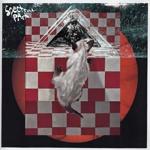
Spectral Park Spectral Park
(Mexican Summer)
It seems that the more we endure this ceaseless assault of novelties we call “the internet,” the harder it becomes for anything to be truly surprising. As a result, it becomes just as hard for artists to gain recognition for originality because, really, we’ve probably heard it before. This leads some artists to seek attention by venturing down into that deranged circus known as shock rock (to the point where Jane’s Addiction ad absurdum statement, Nothing’s Shocking, seems prophetic), while for others, it leads to crafting a novelty project so genuine and unexpected that it catches one off guard. Spectral Park, the self-titled debut from multi-instrumentalist Luke Donovan, belongs to the latter.
Chaos will most likely be the lasting impression many take from this album, and it’s not a flawed impression. The hodgepodge of sounds, riffs, melodies, harmonies, and rhythms comes, literally, from a crate of old vinyl records left for garbage. It’s a meticulous process that included feeding each of these records through a sampler, layering over live instrumentation, adding vocals, and heavy compression.
Lows, one of the album’s poppy songs, delivers the clearest display of this songwriting style. From the intro’s sample (a sort of world-influenced folk track), Donovan begins building upon the sample’s rhythm with his own guitar effects, vocal melodies, and drum beats as the sample is distorted into an indiscernible hiss. The end result is unpolished, frantic, and scattered – something that should almost always be admired.
At its best, the effect of this album is exhilarating. Listening to highlights such as Ornaments, Colours, or The Thief’s Journal, the way in which Donovan incorporates different samples throughout each song, leaves a lingering sense of anticipation. Another part of the intrigue is discerning what is Donovan’s creation and what is sampled. But ultimately, what is most satisfying is how the samples and their distorted variations become instruments just as much as the instruments Donovan plays himself. The line between these vinyl samples and Donovan’s added instrumentation becomes obscured by the cluttered assembly of each song.
The album’s downfall is its strenuous complexity. Indeed, as laborious as it must have been to assemble these songs from scratch, it is just as arduous to endure an entire album of Donovan’s manic psychedelia. It’s a shame, because some of the songs, Generation Loss in particular, are fantastic songs, but they are lost in an album with an exhaustive taste for attention deficit pop. For a novelty pitch at psychedelic pop, the album succeeds – it’s the overall cohesion that seems to be left out of the equation.
6 February, 2013 - 04:40 — David Hogg